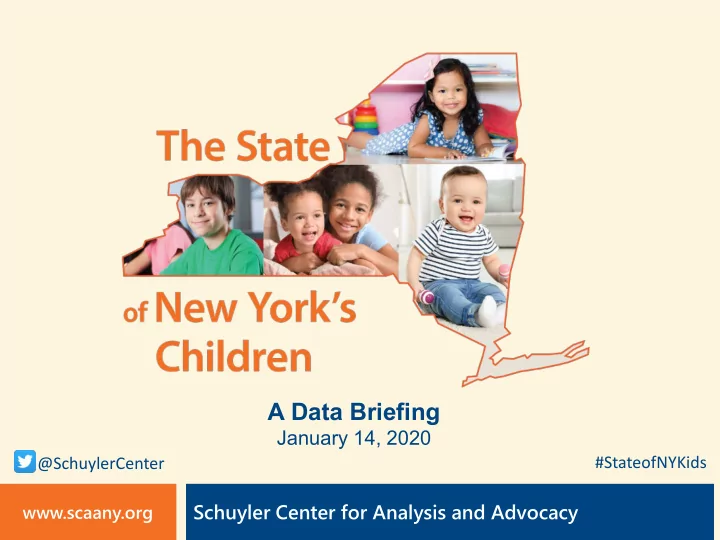

A Data Briefing January 14, 2020 #StateofNYKids @SchuylerCenter Schuyler Center for Analysis and Advocacy www.scaany.org
What all children need to thrive 1 Strong and economically stable families Healthy bodies and minds Safe homes and communities A sound education
Childhood poverty and inequity are prevalent in New York 2
The younger the New York child, the more likely the child is to live in poverty 3
Child care is unaffordable for nearly all New York families 4
New York child care workforce earns poverty wages 5
Solutions 6 Set child poverty Expand access targets; to quality child strengthen care NYS refundable tax credits Fairly compensate and support Increase full-day early seats pre-K childhood outside NYC workforce
Health in the earliest years — beginning with the future mother’s well-being before she becomes pregnant — strengthens developing biological systems that enable children to thrive and grow up to be healthy adults. –Center on the Developing Child, Harvard University
Coverage provides opportunity 8
Family health is child health 9 Families play a crucial role in building healthy environments and engaging in healthy behaviors children need to thrive. Developmental Parental Low Birth Prenatal Care Mental Health Weight Delays
Solutions 10 Protect and Improve expand screening, access to referral and coverage treatment Ensure a Think outside robust health care public health system system
By strengthening birth, kin, and foster families, New York can improve outcomes for children 11
New York has reduced the number of children in foster care by 71% in 23 years 12
Black children continue to be disproportionally represented in New York’s foster care system 13
Children experience better outcomes when they are cared for by supportive families 14
KinGAP is underused 15
Solutions 16 Invest in primary Expand prevention evidence-based to strengthen prevention families through Family before any First Act risk of abuse or neglect Strengthen & Increase prioritize support for family-based kinship foster care families
Medicaid provides vital coverage 17 Children make up 38% of New York residents covered by Medicaid and Child Health Plus. 100% children in foster care 84% of children who live in or near poverty 51% of children born to moms covered by Medicaid 50% of children with disabilities or special health care needs 45% of all infants, toddlers and preschoolers Georgetown University Center for Children & Families and American Academy of Pediatrics, March 2019
Medicaid benefits beyond good health 18 Children with Medicaid: Miss less school Do better in school Graduate and attend college Become healthy adults Earn higher wages Pay more taxes Georgetown University Center on Children & Families and American Academy of Pediatrics, March 2019
Medicaid Matters to children and families 19 By making health insurance accessible to children and parents, Medicaid keeps families healthy while also protecting them from financial hardship. For millions of New Yorkers, Medicaid is a lifeline that keeps them living above the poverty line.
Solutions 20 Family Essential for economic overall security well-being Remember intent of Look beyond the one budget program year
Recommend
More recommend